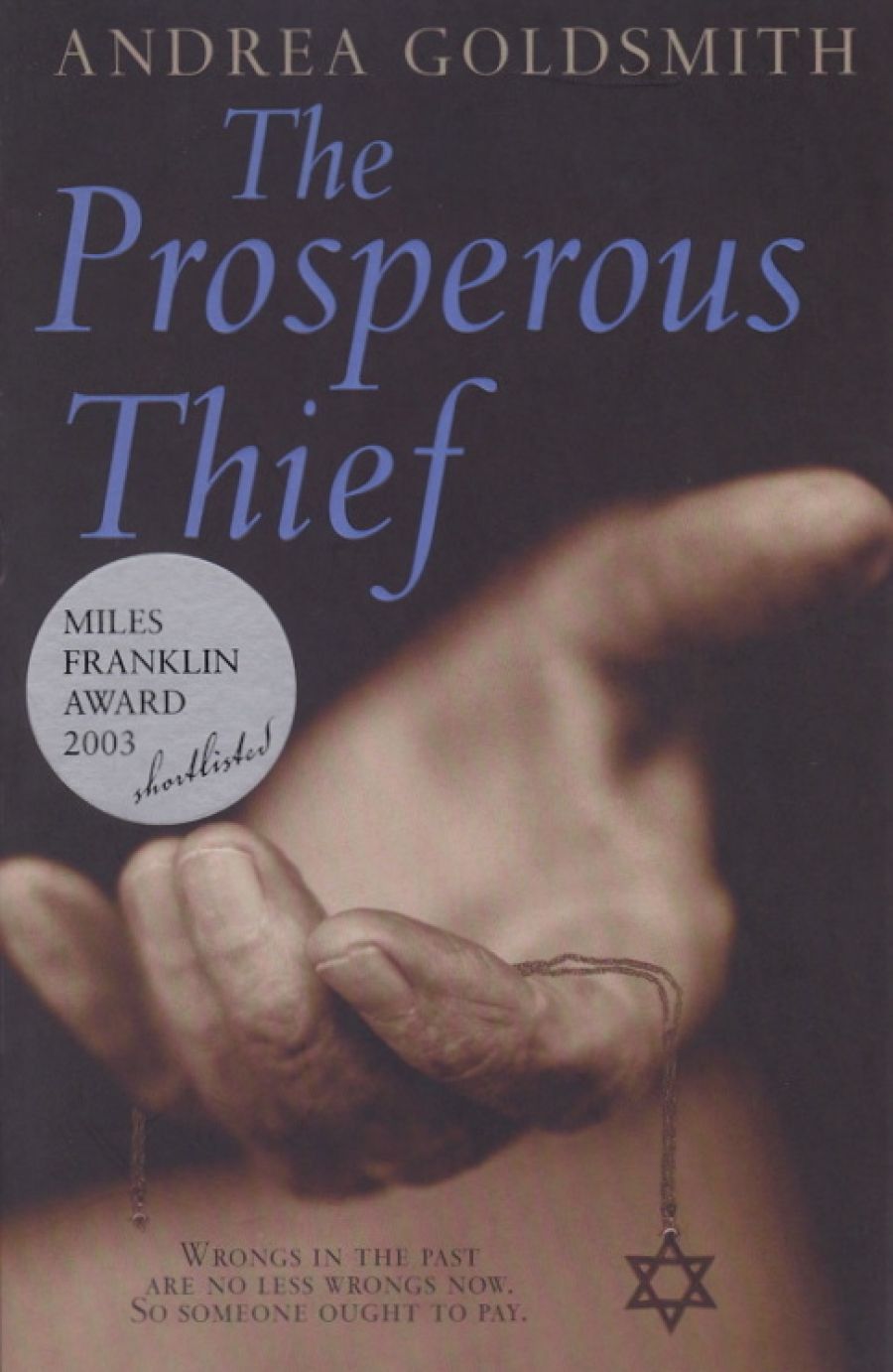
- Free Article: No
- Contents Category: Fiction
- Custom Article Title: Don Anderson reviews 'The Prosperous Thief' by Andrea Goldsmith
- Review Article: Yes
- Online Only: No
- Custom Highlight Text:
'History always emphasises terminal events,’ Albert Speer observed bitterly to his American interrogators just after the end of the war, according to Antony Beevor in Berlin: The Downfall 1945 (2002). Few events in recent history were more terminal than the Holocaust, it might be urged. Yet the singularity of that ‘terminus’ has been questioned in recent years ...
- Book 1 Title: The Prosperous Thief
- Book 1 Biblio: Allen & Unwin $27.95 pb, 291 pp, 1865087564
But, right or wrong about the ‘not another Holocaust novel’ question, I was wrong about Goldsmith’s novel, which uses its Holocaust first half – where a life is crucially taken, not saved – to establish and generate its post-Holocaust second, its Revenge tragedy, so to speak. Both within and beyond this novel, Goldsmith has expressed her admiration for Henry James. It might be suggested, not too fancifully, that The Prosperous Thief shares with The Ambassadors that ‘hourglass’ plot shape that E.M. Forster discerned in James’s novel. Which is why one ought never judge a novel by its first half. Alice, who as an adult runs the risk of forgetting what she has witnessed during the war, is the focus of those questions at the novel’s core:
Can a child watch her father being bashed to a bloody husk and not be affected? Can she see her grandmother rise like a phoenix and crash to her death, or witness her mother so immured in grief she is no longer in the world? Can a child see all this and not bear scars? Can she domesticate such horrors and continue with life? Or does she try to snuff out memory and decide that whatever she saw simply did not happen? It’s hard to know with Alice, but if she does remember, she wears her horrors chastely.
Andrea Goldsmith’s Jamesian ‘turn’ is to have Alice’s generation, those who witnessed and suffered, who escaped Nazi horrors by way of the Kindertransport scheme, wear their horrors chastely, whilst the next generation, after discovering the truth, at least contemplate wearing their parents’ horrors anything but lightly. ‘Revenge, Raphe, Revenge!’ is the urge of the novel’s second half, but the form the revenge might take has a moral complexity all its own. Whether this revenge is taken remains open, as the novel ends on a sort-of Reichenbach Falls in Hawaii, on the lip of a volcano (Raphe is a volcano lover). The Sherlock Holmes allusion, while not made by the novel, is appropriate, for, as The Prosperous Thief progresses, it increasingly takes the form of a moral thriller.
Is there any balder theme-summary than that required below an ISBN number? ‘1.Jews - Australia - Fiction. 2. Jews - Fiction. 3. Holocaust, Jewish (1939–1945) - Fiction. 4. Lesbianism in literature.’ Is there a conversion to heterosexuality at this novel’s end? Does Jewishness overthrow lesbianism? Are these tactless questions? Is the novel’s ending too ambiguous for its own good? Does Jamesian drama become melodrama? Does this intelligent novel occasionally lapse into women’s magazine gush? (‘“It happens, darling,” Nell said with an emphatic raising of her eyebrows, and popped a strip of roasted capsicum in her mouth.’ Or does that reveal Goldsmith to be the anonymous author of the wonderful ‘The Group’ column that graced the pages of The Australian’s Review of Books?) Albert Speer may have been correct in complaining that history overemphasises terminal events. Is the novel, is literature, freer than the determinations of history? On the one hand, terminal ambiguity; on the other, George Eliot’s character is destiny. The Prosperous Thief seriously and thoughtfully engages with such issues, providing a timely reproof to Drusilla Modjeska’s, and others’, strictures that the contemporary Australian novel fails to deal with significant historical and social material.


Comments powered by CComment